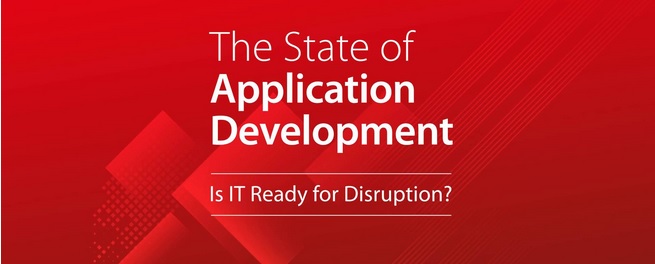Parasoft announces the opening of its new office in Northeast Ohio.
The number of applications slated for delivery in 2019 has increased 60%, 38% of whom plan to deliver 25 or more apps this year, according to The State of Application Development, 2019: Is IT Ready for Disruption? a report from OutSystems based on survey results from more than 3,300 IT professionals in all industries across the world.

"Our 2019 survey shows that many IT departments are facing a multitude of disruptive forces when it comes to digital transformation and application development," said Steve Rotter, CMO for OutSystems. "The threat of digital disruption and the need for digital transformation has been a driver of IT strategy for years. Add to that the current uncertain global economic outlook, and it becomes obvious why business leaders are so concerned about agility today."
"Digital transformation dominates business strategy today, which is why web and mobile development demand is booming. Moreover, speed and agility are more important than ever before", Rotter added.
More survey findings include:
Steep development time
46% of respondents said the average time to deliver a web or mobile application is five months or more.
Backlogs remain
64% of IT professionals said they have an app dev backlog, and only 39% said their app dev backlog had improved in the past year.
Development talent hard to find and keep
Most respondents have hired developers, 75% of respondents described app dev talent as scarce, and only 36% of organizations have larger app dev teams than a year ago. The numbers appear to show retention of app dev talent is an equally grave concern.
Agile practices are still slow to mature
60% of organizations have invested in agile tools and services in the past year. However, the average agile-maturity score was a lackluster 2.7 out of 5, meaning most organizations are still in the process of defining agile processes.
Customer-centricity continues to rise
Over 60% of organizations have invested in customer-centric practices in the past year, including customer journey mapping, design thinking, and lean UX. For the new apps slated for development in 2019, those that will be used directly by customers or business partners were identified as most important.
Low-Code Has Become Mainstream
Another key research finding was that low-code is no longer just for innovators and early adopters. For example, 41% of respondents said their organization was already using a low-code application platform. And, a further 10% said they were about to start using one.
The analysis in the report identified that organizations using low-code are:
■ 26% more likely to describe their organization as satisfied or somewhat satisfied with the speed of application development
■ 11% more likely to deliver web applications in four months or less
■ 15% more likely to deliver mobile applications in four months or less
■ 20% more likely to score their agile maturity as level 3, 4 or 5
■ 12% more likely to say that their app dev backlog has improved since last year
■ Reporting a 16% higher self-assessment score for digital transformation maturity
Industry News
Postman released v11, a significant update that speeds up development by reducing collaboration friction on APIs.
Sysdig announced the launch of the company’s Runtime Insights Partner Ecosystem, recognizing the leading security solutions that combine with Sysdig to help customers prioritize and respond to critical security risks.
Nokod Security announced the general availability of the Nokod Security Platform.
Drata has acquired oak9, a cloud native security platform, and released a new capability in beta to seamlessly bring continuous compliance into the software development lifecycle.
Amazon Web Services (AWS) announced the general availability of Amazon Q, a generative artificial intelligence (AI)-powered assistant for accelerating software development and leveraging companies’ internal data.
Red Hat announced the general availability of Red Hat Enterprise Linux 9.4, the latest version of the enterprise Linux platform.
ActiveState unveiled Get Current, Stay Current (GCSC) – a continuous code refactoring service that deals with breaking changes so enterprises can stay current with the pace of open source.
Lineaje released Open-Source Manager (OSM), a solution to bring transparency to open-source software components in applications and proactively manage and mitigate associated risks.
Synopsys announced the availability of Polaris Assist, an AI-powered application security assistant on the Synopsys Polaris Software Integrity Platform®.
Backslash Security announced the findings of its GPT-4 developer simulation exercise, designed and conducted by the Backslash Research Team, to identify security issues associated with LLM-generated code. The Backslash platform offers several core capabilities that address growing security concerns around AI-generated code, including open source code reachability analysis and phantom package visibility capabilities.
Azul announced that Azul Intelligence Cloud, Azul’s cloud analytics solution -- which provides actionable intelligence from production Java runtime data to dramatically boost developer productivity -- now supports Oracle JDK and any OpenJDK-based JVM (Java Virtual Machine) from any vendor or distribution.
F5 announced new security offerings: F5 Distributed Cloud Services Web Application Scanning, BIG-IP Next Web Application Firewall (WAF), and NGINX App Protect for open source deployments.
Code Intelligence announced a new feature to CI Sense, a scalable fuzzing platform for continuous testing.
WSO2 is adding new capabilities for WSO2 API Manager, WSO2 API Platform for Kubernetes (WSO2 APK), and WSO2 Micro Integrator.




